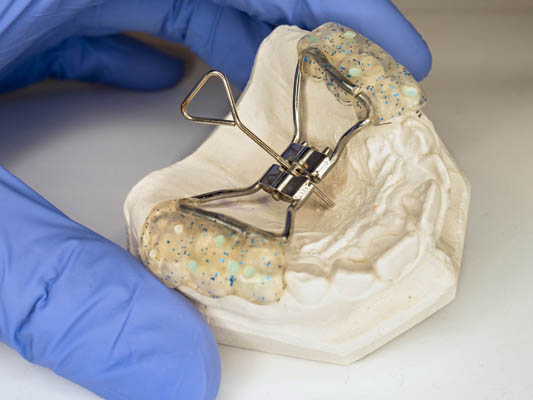Adjusting to a Palatal Expander

Crowded teeth are no fun, and if you have a child who is likely to develop this problem, it can be avoided by a palatal expander. This method is proven to widen the roof of your child's mouth so that teeth have room to grow. When teeth are crowded, they tend to grow in the wrong direction because there is not enough room for them between their surrounding teeth. This is known as an impacted tooth, and it can not only be painful, but it can also make flossing especially difficult and lead to an embarrassing smile.
Another reason to get an expander is to avoid developing a crossbite. If your palate develops too narrow, your upper and lower jaw will not align properly, and when you bring your teeth together with this misalignment, the upper teeth will settle inside the lower teeth leading to gum disease and tooth chipping.
The ideal age
When a child is around the age of seven or eight, their palate is forming rapidly, and this makes it an ideal time for a dentist to reshape their palate. As a child gets older, their palate structure begins to solidify, and by the time that child has reached puberty, it becomes more difficult for that palate to widen. For this reason, most dentists recommend palate expander treatment before the child reaches the age of 12 or 13.
Types of palatal expanders
Expanders for teeth come in two separate forms: fixed and removable. Before choosing the right palate expander for your child, a dentist will want to consider their age and unique palate shape before having one custom-made.
For a fixed palate expander, your child could receive the rapid palate expander, which has a center screw with four branches that attach to your back teeth in a parallel formation. These expanders are usually worn for three to six months, and it is the responsibility of the patient or their parents to insert a small key into the center screw of this expander and turn it just a little each day to widen it.
For a child whose palate needs only minimal expansion, there is a removable expander that resembles an acrylic retainer. This removable expander also has a center screw that needs to be turned.
There is also hope for older patients who are finding they could benefit from an expander, and that is the mini implant assisted rapid palatal expander. This kind of expander applies pressure directly to the palatal bones instead of the teeth and also requires the turning of a screw.
Adjusting to a palatal expander
As your palate is expanded, there may be some discomfort at first, and the expander may also feel a little heavy in your mouth at first. As the patient gets used to the expander, they will notice it less. At first, talking will seem a little different, and for the first few hours, the patient may find that they speak with a lisp, but this too will go away in a few hours to a day. The more the patient talks, the sooner they will get used to the expander.
Request an appointment here: https://www.bracesbyabbadent.com or call Braces By Abbadent at (563) 484-5202 for an appointment in our Dubuque office.
Check out what others are saying about our services on Yelp: Read our Yelp reviews.
Recent Posts
If your child has extensive dental malalignment, Invisalign® for teens may not be appropriate. However, if the malalignment is relatively mild, you and your child may have the option of choosing between clear aligners and traditional braces. Comparing and contrasting the two treatments can help you decide which would most benefit your teen.There are few…
If your dentist has recommended that you get braces, you should know that they can improve your oral health. Braces are about more than simply straightening your teeth. Braces will also help you avoid cavities. Getting braces now can help you have straighter teeth later. Read on to learn how braces can do this.A dentist…
Considering Invisalign for adult teeth straightening? While most consider teeth straightening to be for children, there are a lot of adults that require a re-alignment of the teeth. Teeth can shift over time, which can result in a need for braces or better yet, Invisalign. Invisalign is a popular treatment option for teeth straightening. Ready to find out…
Curious about ceramic braces? Read on to learn more about this teeth-straightening option. Ceramic braces, sometimes known as transparent braces, have been available for decades. Although transparent aligner solutions have made them less popular, they are still a wonderful choice for people seeking reasonably discreet treatment. Ceramic braces provide patients with a less noticeable option…


